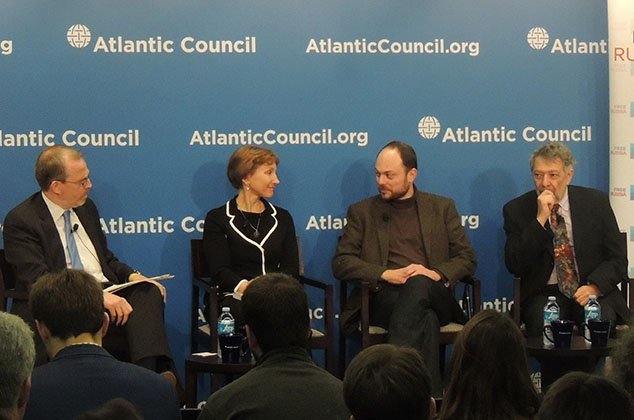 Russian opposition groups will continue to face threats and violence if Western powers remain on the sidelines amid a Kremlin crackdown on media and democratic processes, according to opposition actors.
Russian opposition groups will continue to face threats and violence if Western powers remain on the sidelines amid a Kremlin crackdown on media and democratic processes, according to opposition actors.
“I think there is nothing better that they would like us to do than to hide, to run away, to stop doing what we’re doing,” said Vladimir Kara-Murza, a Senior Policy Advisor at the Institute of Modern Russia, “and we’re not going to give them that pleasure.”
Kara-Murza, who survived an attempt on his life in Moscow last year, articulated the defiance that the Russian opposition shows in continuing its work in spite of the fact that Russian President Vladimir Putin’s administration has proven its willingness to kill those who speak against it regardless of their citizenship, or national borders.
Kara-Murza spoke at an event hosted by the Atlantic Council’s Dinu Patriciu Eurasia Center on March 15. Marina Litvinenko, the widow of murdered former Russian spy Alexander Litvinenko, and Alex Goldfarb, Co-founder of the Litvinenko Justice Foundation, also joined the panel discussion, which was moderated by David Kramer, Senior Director for Human Rights and Democracy at the McCain Institute for International Leadership.
Alexander Litvinenko was fatally poisoned with radioactive polonium-210 in London in 2006. In January of this year, Marina Litvinenko won a major victory in seeking justice for her husband. British judge Sir Robert Owen released the “Report into the death of Alexander Litvinenko,” which concluded that the “FSB operation to kill Mr. Litvinenko was probably approved by Mr. [Nikolai] Patrushev [the head of the FSB at the time] and also by President Putin.” The FSB is a Russian state security organization.
While the report’s release is a victory and testament to Marina Litvinenko’s perseverance, she said “it is not the end of the road.”
The Russian opposition’s struggle is not just with anti-opposition tactics employed by the Russian government, but also with Western apathy toward those tactics.
Goldfarb voiced this sense of tacit international approval of the Russian regime.
“I am old enough to remember Soviet times, when dissidents were given public support by leaders of the Western world. [Now] we have a government with a citizen [Litvinenko] who was killed in the center of their capital with a radioactive weapon. And you have a very lukewarm reaction by the [British] government; we’re here on our own,” said Goldfarb.
Asked how citizens and governments in the West can best help activists in Russia, Kara-Murza responded, “The job of bringing democratic changes to Russia, that’s our job, nobody else’s; it’s for the Russian opposition.”
He stressed the importance of sanctions in shaping the attitudes of the Russian regime. “What we do ask of our friends and partners in the West is to stay true to your own values and principles,” he said.
In drawing comparisons between Soviet and contemporary Russia, Kara-Murza highlighted the ability of Russian government officials to interact with Western powers. He noted that certain Russian government officials can travel freely, bank, and become educated in Western countries; freedoms that were largely denied to the Soviet elite.
Describing the driving interest and ideology of the regime, Marina Litvinenko said, “After the Soviet Union collapsed [there was] no ideology of communism, but a country can’t live without an ideology, and he [Alexander Litvinenko] said that these people who took over Russia [after the fall of the Soviet Union] have only one ideology: money.”
Kara-Murza’s call to action was for a stronger implementation of the Magnitsky Act, a US-led legislative agreement passed in 2012 that punished Russian officials responsible for the death of lawyer Sergei Magnitsky, and a strengthening of US and EU sanctions on Russia. Only by targeting the Russian regime’s interests can the West persuade democratic change in Russia, all the panelists agreed.
“[Russian leaders] perceive the very existence of free societies as a threat to their own power,” said Goldfarb. “They perceive notions of human rights and justice as an existential threat,” he added.
This threat, posed by activists seeking reform, democracy, and adherence to international human rights standards, is one to which Putin has proven willing to respond with violence. The memory of those killed in Russia—Alexander Litvinenko, opposition leader Boris Nemtsov, and many others—weighs heavily on Russian opposition groups.
“We have an election approaching this year. First of all, we haven’t had a real free and fair election in Russia in sixteen years…what we have today is a complete mockery of the electoral process,” said Kara-Murza.
“Nothing is forever, Mr. Putin is no exception, and the day will come when we have to fight a real election. But it will be too late to get ready then, we have to get ready now,” he added.
Mikaila Altenbern is the communications coordinator at the Atlantic Council.
Image: From left: David Kramer, Senior Director for Human Rights and Democracy at the McCain Institute for International Leadership, moderated a discussion on “Silencing Voices of Russian Opposition” with Marina Litvinenko, the widow of murdered former Russian spy Alexander Litvinenko; Vladimir Kara-Murza, a Senior Policy Advisor at the Institute of Modern Russia; and Alex Goldfarb, Co-founder of the Litvinenko Justice Foundation, at the Atlantic Council on March 15. (Atlantic Council)
